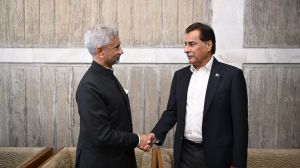Crossing a Mountain
From the East Coast to the West Coast though, admittedly, not yet a lot of places in between everyone8217;s talking about Brokeback Mount...

From the East Coast to the West Coast though, admittedly, not yet a lot of places in between everyone8217;s talking about Brokeback Mountain. I haven8217;t heard such constant and pervasive chatter about a pop cultural topic since Tom Cruise jumped on Oprah8217;s couch. Lord knows, the two phenomena having nothing in common8212;Brokeback Mountain is a love story about two gay cowboys, and Tom Cruise is, you know, Tom Cruise. So how has this art-house film, a 8216;8216;gay movie8217;8217; whose target audience is ostensibly the small percentage that identifies as homosexual, managed to insinuate itself into the hearts and cocktail-party conversations of so many heteros?
It8217;s that 51 per cent of the population known as women, stupid! Despite its vast Western landscapes, drunken cowboy talk and gay sex scenes, Brokeback Mountain is a thinking girl8217;s chick flick with roughly the same hormonal balance not to mention the same screenwriter as that quintessence of high-quality estro-cinema, Terms of Endearment.
I8217;m not talking about the obvious girl-friendly accoutrements of the tough guy/tender heart dichotomy8212;the men8217;s skillful horsemanship, their penchant for carrying injured lambs on their laps, the way they look in jeans. I8217;m talking about something much more visceral. For all their monosyllabism, Jack Jake Gyllenhaal and Ennis Heath Ledger are fonts of emotion. Sure, they8217;re prone to the usual male-pattern of drinking, fighting and marrying women without knowing quite what they8217;re doing, but when it comes to their love for each other, their hearts aren8217;t just on their sleeves, they8217;re pinned to their foreheads.
It8217;s curious to see how the Jack/Ennis model of ideal manhood has come about just as metrosexuality8212;that marketing campaign for hair gel disguised as a social trend8212;is on the wane. Instead of merely acquiring the trappings of kinder, gentler manhood, Jack and Ennis actually walk the walk.
The sight of Jake Gyllenhaal crying in his truck as he drives away from Ennis who retreats to an alley and vomits in tortured despair is enough to make even the bitterest woman swoon. That moment, like so many in the film, feels like an epiphany not because of the gay context but because for once someone other than the woman is crying. Traditionally, women have done the heavy emotional lifting. We8217;re the ones who scream and probe and force conversations about the relationship while the man stews in confusion as to whether he8217;s feeling vulnerable or just hungry for a steak.
With Jack and Ennis, however, there8217;s no woman to pick up the emotional slack, and they8217;re forced to experience their feelings without the benefit of female translation or analysis.
LAT-WP
- 01
- 02
- 03
- 04
- 05































